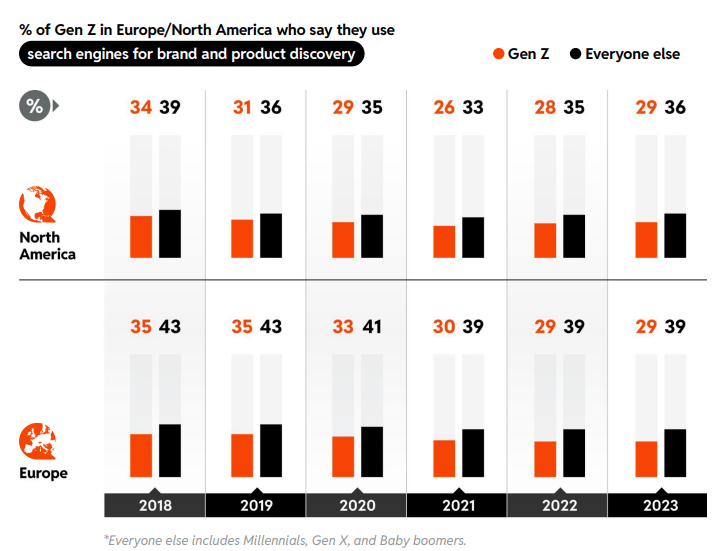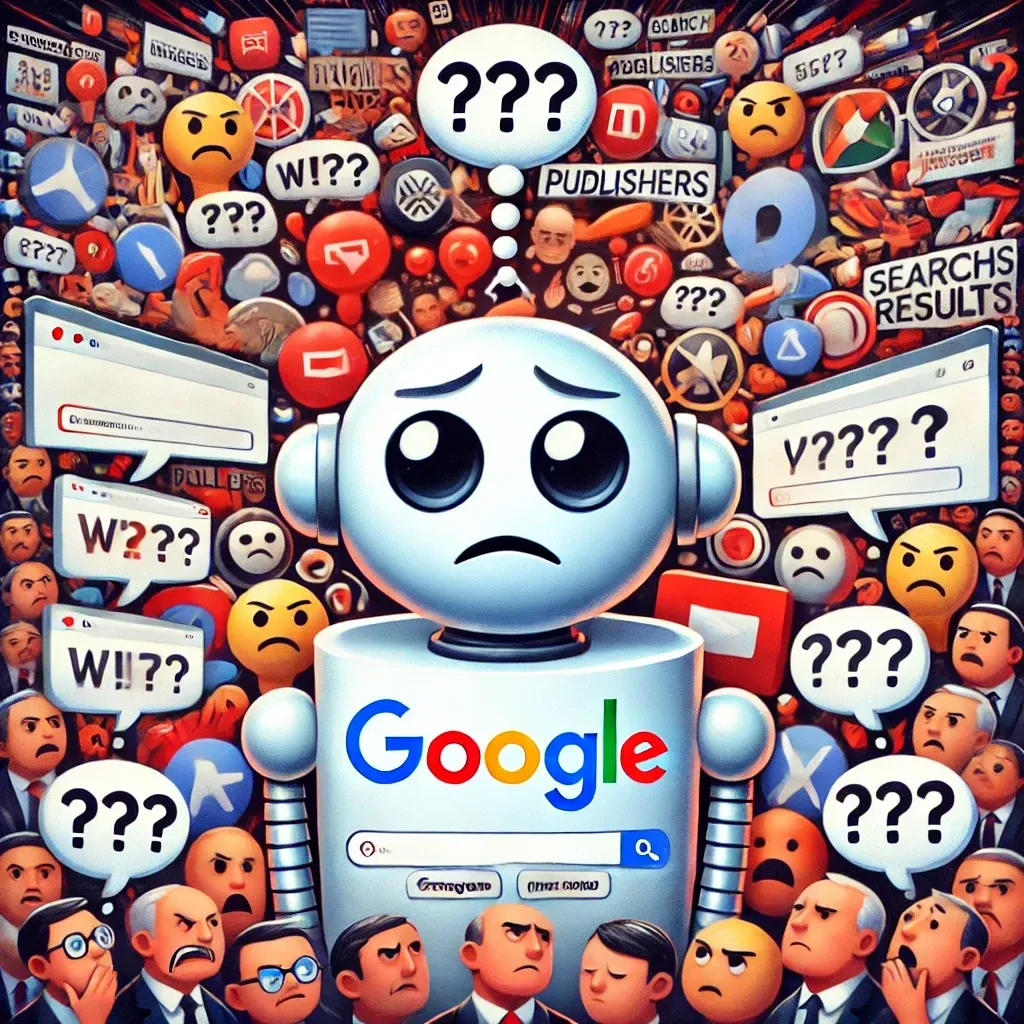Big G's Product Problem, Aggregators vs Local Biz, Section 230 Recklessness

Product Search: More Problems for Big G
Multiple surveys in the market (e.g., here, here) illustrate seemingly growing challenges for Google in retaining younger users (GenZ). A very recent survey from Scorpion also showed that many people are frustrated with the search experience. The big picture is that many users, especially younger people, are seeking alternatives to Google – at least in some categories. This includes local discovery and product search. A new US-EU report from Reddit and GWI explores how GenZ is turning to social media for product discovery, as a search alternative. While the report is self-serving for Reddit, it contains multiple findings of note. The chart below, for example, shows how the percentage of GenZ using "search engines for brand and product discovery" has generally been declining since 2018. It's now about 29% in both Europe and the US. Amazon, of course, is the product search elephant in the room, unfortunately not addressed in the survey. The Reddit survey also reflects frustration with search quality and efficiency. Among users' frustrations: content reliability, the need to sift through multiple pages of results and having to go to multiple sources to get answers. And too many ads was the top single complaint, undermining trust (roughly half of respondents). But the report also found that GenZ distrust social media content to varying degrees.

Our take:
- No single survey should be treated with too much deference; however, multiple surveys paint a clear directional picture.
- There's a broad perception now that search quality is declining and that the search experience is polluted with too many ads.
- Google's AIOs attempt to address these complaints. But the company is generally leaning into them, with more ads, more SERP modules and more overall clutter.
Google Spin: Aggregators vs Local Biz
Google has made SERP changes in Europe to comply with the Digital Markets Act (DMA). So far their impact on user behavior appears minimal. Many of these changes relate directly or indirectly to local: Places refinement chips (filters), Places Sites Aggregator Carousel, a second local pack, and an Aggregator Carousel (multiple results from a single company). Google has also done testing of new local-heavy SERPs, in Europe and the US, that show GBP listings almost to the exclusion of organic results. In some of these cases, the tests appear to fly in the face of DMA anti-self-preferencing rules (e.g., multiple Packs). Yet Google is trying to define local entirely outside the scope of its DMA compliance obligations. As we previously wrote, Google seems to be arguing that Google Business Profiles are part of its "core search service" and should therefore be exempted from regulatory enforcement. Google also is rhetorically trying to play up opposition or competition between local businesses and aggregators (TripAdvisor, Yelp, etc.) with Google as the champion of direct local information. What consumers really want, the subtext goes, is direct access to local data not third parties, once removed.

Our take:
- Google's local graph data, though compiled from public factual information, is absolutely a Google product and should be thought of that way.
- The aggregator vs. "supplier" conflict is partly real. People often want direct information and don't want to conduct another search on a third party site.
- But if Google kills aggregators there will be many fewer places online (and competitors) for local information. Look at what happened in digital mapping.
Section 230 Recklessness
Since the start of Near Media, we've written multiple times about Section 230, which was originally enacted as part of the Communications Decency Act in 1996. It says that "No provider or user of an interactive computer service shall be treated as the publisher or speaker of any information ..." And it offers immunity to online platforms for content that appears on their sites. Essential in the beginning, it has been exploited by digital behemoths to avoid responsibility for their often toxic content. And it has allowed companies like Meta and Twitter/X to significantly reduce the resources they spend on moderation (Europe's DSA could change that). Recognizing these problems, there have been several failed attempts at Section 230 reform in Congress. An article in 404 Media argues that Section 230 is at least partly to blame for Facebook's declining interest in safety and content quality (because they can), resulting in an increase in AI spam and scams, hacking, porn, and ads for illegal activities. In a topically adjacent article, The Atlantic calls Google AI Overviews a potential "Libel Machine." It explains that hallucinated, defamatory information about individuals is a significant risk with AI. If Google were considered a "publisher" there would be legal exposure, but for Section 230.

Our take:
- In the same way that telcos were "publishers" of yellow pages, Google is today a "publisher" of local information, without question.
- US Supreme Court Justice Neil Gorsuch suggested that AI-generated content (e.g., AIOs) might be outside Section 230 protection in Google vs. Gonzalez.
- This is another reason why Google should be cautious about AI Overviews.
Recent Analysis
- Local Search Is Evolving, Here's Why You Need to Pay Attention, by Mike Blumenthal.
- Near Memo episode 162: Expanding local results, cluttered SERPs reduce organic traffic, AI overviews make it worse.
Short Takes
- Here are the Google Business Profile ranking factors.
- Google removing the ability to dispute leads in LSAs.
- Google using AI for GBP business descriptions, frustrating owners.
- Winning vs. competitors when SEO is stacked against you.
- The amount of "content effort" may be a ranking factor.
- Gemini side panel now live in Gmail, Drive, Docs, Sheets, and Slides.
- Apple the first "gatekeeper" formally charged under the EU's DMA.
- Apple Intelligence not coming to EU (for now) because of DMA.
- AI tools not (yet) good enough for technical SEO analysis.
- How small claims court became Meta's customer service hotline.
- Google getting rid of credit card payments for some advertisers.
- Google enters the credit card affiliate marketing space.
Listen to our latest podcast.

How can we make this better? Email us with suggestions and recommendations.

